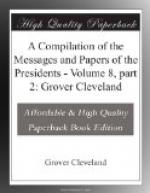It was believed, however, that to so abandon that position under the circumstances would be utterly ruinous; that the necessity under which it was to be done would not be fully understood; that by many it would be construed as a part of a voluntary policy; that at home it would discourage the friends of the Union, embolden its adversaries, and go far to insure to the latter a recognition abroad; that, in fact, it would be our national destruction consummated. This could not be allowed. Starvation was not yet upon the garrison, and ere it would be reached Fort Pickens might be reenforced. This last would be a clear indication of policy, and would better enable the country to accept the evacuation of Fort Sumter as a military necessity. An order was at once directed to be sent for the landing of the troops from the steamship Brooklyn into Fort Pickens. This order could not go by land, but must take the longer and slower route by sea. The first return news from the order was received just one week before the fall of Fort Sumter. The news itself was that the officer commanding the Sabine, to which vessel the troops had been transferred from the Brooklyn, acting upon some quasi armistice of the late Administration (and of the existence of which the present Administration, up to the time the order was dispatched, had only too vague and uncertain rumors to fix attention), had refused to land the troops. To now reenforce Fort Pickens before a crisis would be reached at Fort Sumter was impossible, rendered so by the near exhaustion of provisions in the latter-named fort. In precaution against such a conjuncture the Government had a few days before commenced preparing an expedition, as well adapted as might be, to relieve Fort Sumter, which expedition was intended to be ultimately used or not, according to circumstances. The strongest anticipated case for using it was now presented, and it was resolved to send it forward. As had been intended in this contingency, it was also resolved to notify the governor of South Carolina that he might expect an attempt would be made to provision the fort, and that if the attempt should not be resisted there would be no effort to throw in men, arms, or ammunition without further notice, or in case of an attack upon the fort. This notice was accordingly given, whereupon the fort was attacked and bombarded to its fall, without even awaiting the arrival of the provisioning expedition.




